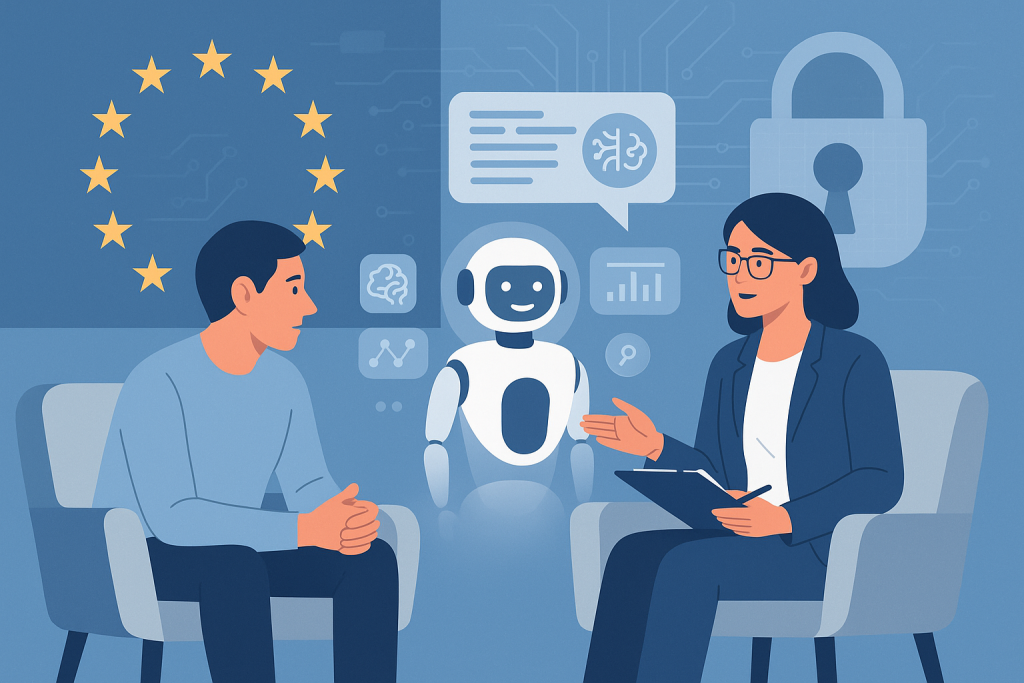
Under the Act, many AI systems used in therapy fall into the high-risk category. This classification demands that these tools meet stringent standards including:
• Robust, diverse, and accurate data governance to minimize bias
• Transparency so therapists can understand how AI tools generate recommendations
• Human oversight to ensure therapists retain full responsibility for clinical judgment
• Accountability and auditability, allowing systems to be reviewed and challenged as needed
These requirements safeguard patient welfare and help maintain trust in AI-assisted therapy.
What Therapists Need to Ask Before Using AI Tools
Before integrating any AI-supported tool into your practice, ask yourself critical questions: Is this tool approved under the EU AI Act or local regulations? What kind of data does it use, and where is it stored? Does the algorithm reflect diverse populations? Can you clearly understand and explain how it makes decisions? If the answers are unclear or unsatisfactory, it may be unwise or even unsafe to use that tool in clinical settings.
The Irreplaceable Human Element in Therapy
Despite the technical advances AI offers, it can never replace the deeply human elements of therapy. Empathy, cultural sensitivity, ethical reasoning, and clinical intuition remain irreplaceable skills that only therapists bring. AI is a powerful assistant—but therapists must continue to interpret AI outputs within the broader context of the client’s needs, ensuring all interventions remain person-centered and ethically grounded. Clear communication with clients about how AI tools are used is also essential to maintain transparency and trust.
Collaboration and Digital Equity: Shaping the Future
The summit highlighted the importance of collaboration between therapists and AI developers. Practitioners provide invaluable insights into real-world challenges and client diversity, helping guide innovation toward tools that are culturally competent, accessible, and effective. For example, speech-language therapists working with multilingual populations can advocate for AI systems that better handle linguistic diversity—a known limitation of many current models.
Digital equity is another crucial aspect emphasized during the summit. Many clients face barriers to accessing AI-enhanced therapy due to age, socioeconomic status, disability, or geographic location. Ethical practice demands that therapists:
• Offer alternatives for clients without access to AI tools
• Educate clients on how to safely and effectively use digital resources
• Consider hybrid models combining traditional and AI-supported therapy
Ensuring no one is left behind helps make the benefits of AI truly inclusive.
Key Updates from the 2025 EU AI Summit
In addition to these points, the 2025 EU AI Summit brought several key updates to light:
• AI tools must undergo continuous auditing and improvements to address new risks and biases
• Patients now have strengthened rights to be informed when AI plays a role in their care decisions
• EU member states are working toward greater regulatory alignment to create a consistent framework across countries
• A major focus on “explainable AI” aims to prevent opaque “black-box” algorithms from undermining clinical transparency
Looking Forward: AI as a Partner in Ethical Therapy
The EU AI Act and the latest summit remind us that AI should augment therapists’ skills—not replace them. The future of therapy lies in balancing innovative tools with human judgment, ethical integrity, and cultural awareness. As therapists, staying informed about AI’s evolving landscape, critically evaluating tools before adoption, and actively engaging in their development allows us to lead the way in shaping ethical, person-centered AI care.
Coming next: A closer look at how therapy clinics across Europe are implementing the EU AI Act in their daily practices—and the lessons we can all learn from their experiences.
European Union. (2024). Regulation (EU) 2024/1689 of the European Parliament and of the Council of 13 June 2024 laying down harmonised rules on artificial intelligence and amending certain Union legislative acts (Artificial Intelligence Act). Official Journal of the European Union, L 168, 1–158. https://eur-lex.europa.eu/eli/reg/2024/1689/oj
